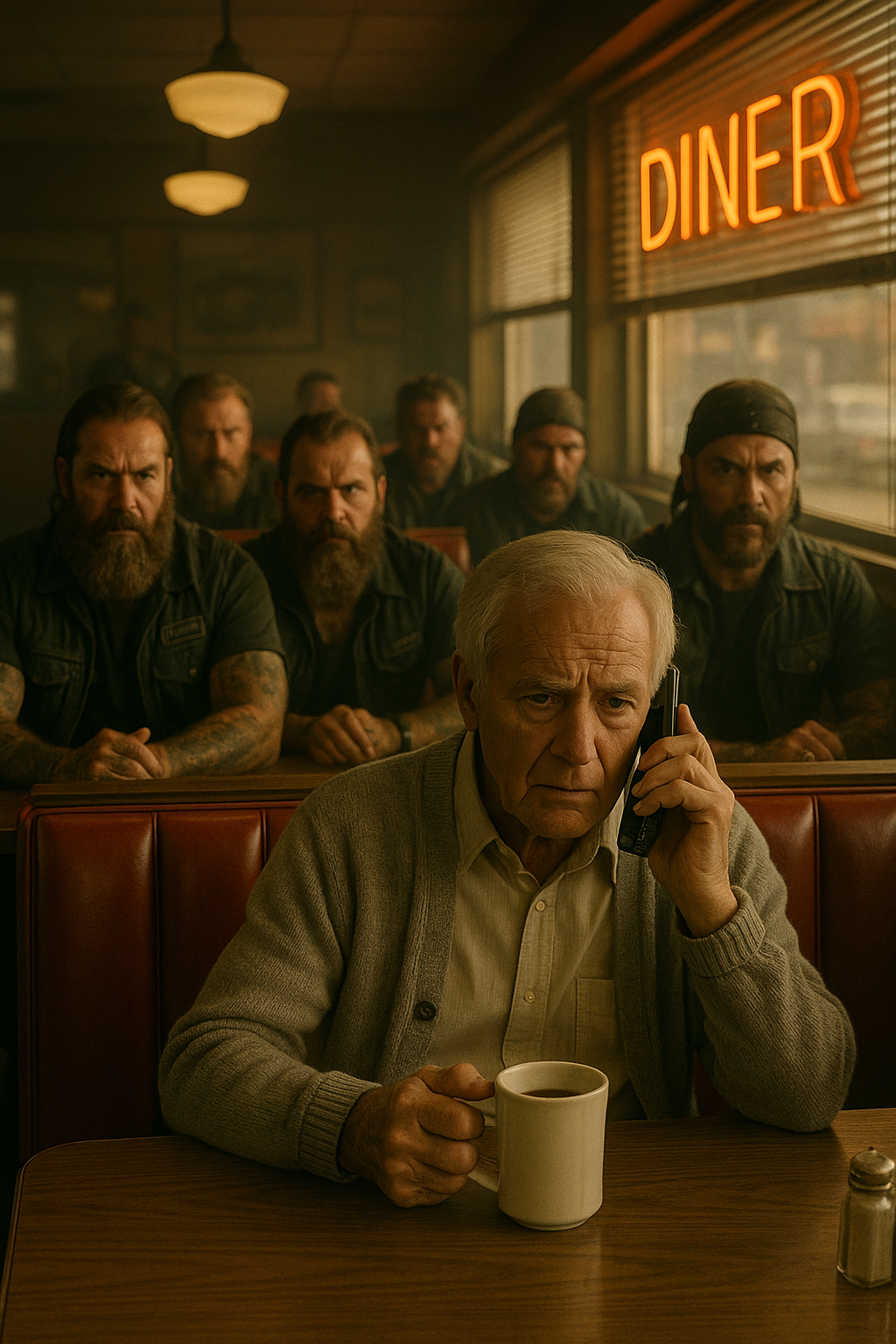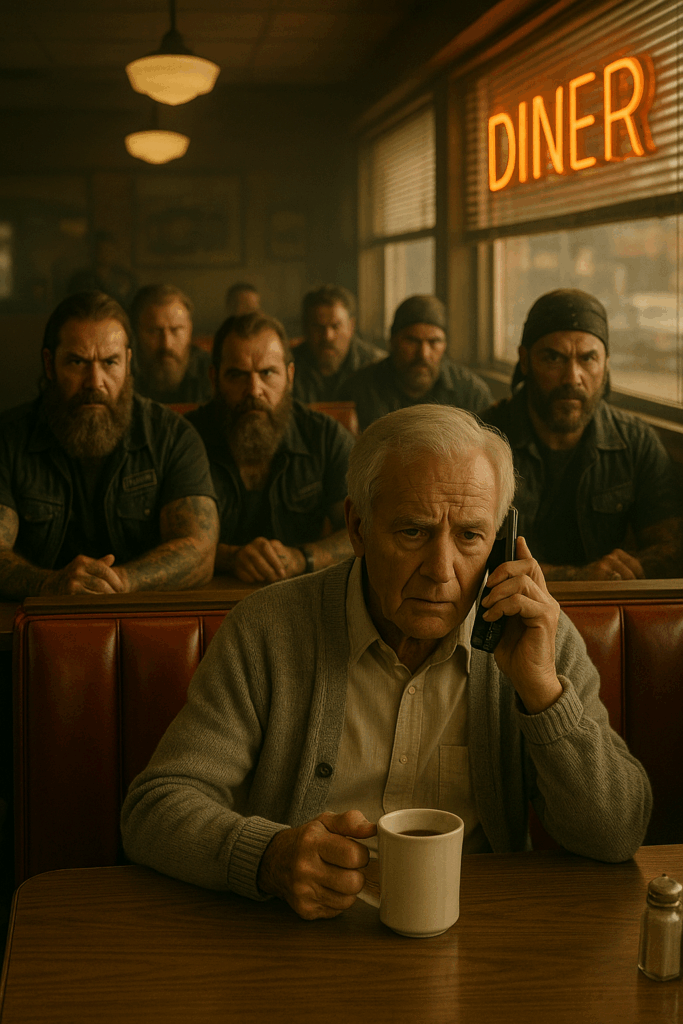Five Bikers Surrounded a 96-Year-Old at a Maine Diner — Seconds Later, Their Faces Went Pale- The day a storm of leather and engines uncovered the quiet past of a man everyone thought they knew.
A Town That Still Remembered Silence
There were towns you forgot after passing through them — and then there was Ashcroft, Maine. The kind of place where the sea smelled of salt and history, and the same flag had waved over the post office since the Korean War.
In the center of town sat Gracie’s Diner — a chrome-sided relic that smelled like coffee and fried nostalgia. Every morning at exactly 7:00 a.m., Arthur Blake walked through its door. Ninety-six years old. Pressed plaid shirt. A polished cane he didn’t really need. Same booth by the window — the one with the view of the harbor. Same order: black coffee, two eggs, no toast. Locals called him Mr. Blake, though some whispered Colonel when they thought he couldn’t hear. He was quiet, courteous, and unfailingly polite. A man made of rules and secrets. And no one in Ashcroft questioned him — until the morning the engines came.
The Thunder Arrives
It started as a vibration under the floorboards — then a sound like an oncoming storm. At 7:23 a.m., five motorcycles tore down Main Street, engines growling in unison, chrome flashing beneath the brittle Maine sun. They pulled into the diner’s lot, shattering the quiet like glass.
The lead bike — matte black with rust on the tank — stopped inches from the diner’s front step. Its rider, tall and broad-shouldered, killed the engine and swung off. His arms were sleeved with scars and old ink. The name Viper glinted from a chain around his neck.
Locals froze.
The Crimson Vultures — a biker crew that ran the stretch from Portland to Bangor. Not cartel, not clean either. The kind of men you crossed only once. Viper pushed open the diner door. The bell jingled cheerfully, mocking the sudden silence that followed.
He scanned the diner — the mothers with their pancakes, the truckers halfway through breakfast — and spotted Arthur Blake, sitting alone, calm as a church pew.
“That’s our booth,” Viper said flatly.
Sally Grayson, the waitress and owner’s daughter, turned pale. “I—I’m sorry, but Mr. Blake—”
“Didn’t ask you,” Viper snapped.
Arthur didn’t flinch. He lifted his coffee cup, sipped, and set it down deliberately.
“You’re mistaken,” he said, his voice low, measured. “This has been my seat since 1974.”
Viper smirked. “Then maybe it’s time you gave it up.”
The diner air tightened. Forks froze midair. A boy at the counter whispered, “Is he crazy?”
Viper leaned closer. “You don’t wanna make this ugly, old man.”
Arthur blinked slowly. “Ugly? Son, I’ve seen ugly.”
Then he reached into his shirt pocket and pulled out an old flip phone. He pressed one button. One ring. Two.
“Calling the cops?” Viper sneered.
Arthur didn’t respond.
A voice answered. Deep. Unmistakably authoritative.
“Colonel Blake. Sir, is everything alright?”
The diner went dead silent.

The Voice That Changed Everything
Every biker froze. Even the jukebox seemed to hold its breath. Arthur put the call on speaker. The name on the cracked phone screen glowed faintly:
“Major H. Donovan (Ret.)”
Viper frowned. “Who the hell—?”
The voice came again, louder, colder.
“Sir, do you require assistance? We can be there in four minutes.”
Arthur stirred his coffee. “Stand by,” he said.
Then he hung up. The silence that followed was almost reverent — like the pause before a sermon or a firing squad. Outside, the rumble began — low and distant. The kind of sound you feel before you hear. One by one, motorcycles appeared over the rise — not black and chaotic like Viper’s crew, but uniform. Disciplined.
The Iron Sentinels. Veterans. Men and women who had once served under Arthur Blake — a decorated commander from a war that never made the headlines but decided them all. The Iron Sentinels pulled in tight formation — fifteen riders in all, each one wearing the insignia of a fallen unit. Their engines idled like restrained thunder. Viper’s hand twitched toward his pocket. “What the hell is this?”
Arthur finally looked up. “These,” he said softly, “are my friends.”
Sally stepped back as the Sentinels dismounted, forming a quiet wall of leather and steel behind their former commander.
Their leader, Major Hank Donovan, removed his helmet and nodded. “Heard there was a problem, sir.”
Arthur nodded slightly toward Viper. “Seems these boys forgot their manners.”
Viper’s jaw tightened. “Look, man— we didn’t know—”
Hank’s eyes narrowed. “You do now.”
The diners pressed against the glass. It looked like the opening scene of a war movie — youth and arrogance facing down something older, quieter, far deadlier. Hank took a step forward, voice calm but edged with iron. “You ever hear of Operation Black Tide?”
Viper blinked. “No.”
“You wouldn’t,” Hank said. “It was classified until two years ago. But that man,” he nodded to Arthur, “led a unit through a firefight that saved forty-three civilians — at the cost of every soldier under his command. He’s the reason this flag still waves over this town.”
Arthur’s gaze stayed on his coffee. “Enough, Hank.” But the younger bikers were already paling. They looked at Arthur differently now — not as a frail old man, but as a living ghost from a world they couldn’t imagine surviving. One of them murmured, “Christ, my grandfather talked about Black Tide.”
Viper swallowed hard, his voice cracking slightly. “We’re… we’re sorry, sir. We didn’t know who you were.” Arthur looked at him for a long moment — not angry, not smug. Just tired.
“Respect,” he said quietly, “doesn’t come from fear. You earn it by knowing who came before you.”
He gestured to Sally. “Bring these men coffee. On my bill.” Hank smiled faintly. “Still teaching lessons, huh?” Arthur just nodded, staring out the window toward the horizon. “Always one more to teach.” When the bikers left, the diner buzzed with quiet awe. But Sally noticed Arthur’s hand trembling slightly as he folded his napkin.
“You alright, Mr. Blake?” she asked softly.
He smiled, eyes distant. “Yes, dear. Just thinking of old friends.” That afternoon, as he paid his bill, Sally noticed something strange on the counter — a folded note beneath his cup. It read: ‘If they ask what happened today — tell them it wasn’t about fear. It was about remembrance.’ Underneath lay a single military tag, scratched and bent. On the back: “Black Tide, 1951.”
That night, Hank Donovan drove to Arthur’s cottage by the sea. The windows were dark, but the front door was unlocked. Arthur sat by the fire, coat folded neatly beside him, a small box on his lap.
“You didn’t need to come,” Arthur said.
Hank took a slow breath. “Those kids— they thought you called me today. You didn’t, did you?” Arthur smiled faintly. “No. That number’s been disconnected for years.”
Hank frowned. “Then how did we know—?”
Arthur lifted the box lid. Inside were dozens of letters — names, addresses, coordinates — the network of veterans he’d quietly kept in touch with for decades.
“Because I taught you to listen,” Arthur said. “And because I knew you’d hear.”
He set the box down. “They weren’t coming for me, Hank. They were coming for what we still stand for.”
The next day, Arthur didn’t come to the diner. Sally poured his coffee anyway, out of habit. By noon, the news spread — Arthur Blake had passed away in his sleep, at peace. That evening, the entire town gathered outside Gracie’s Diner. The Iron Sentinels lined the street, engines idling low. And then, slowly, the Crimson Vultures rode in too. No patches. No noise. Just silence.
Viper dismounted, hat in hand, eyes wet. He placed a single rose and Arthur’s military tag on the diner’s steps.
“He didn’t just scare us,” Viper said quietly. “He reminded us.”
Then, one by one, every biker — veteran and outlaw alike — started their engines and revved once, in unison. A salute. The sound rolled across Ashcroft like thunder and was gone.
A month later, Sally hung a photograph on the diner wall. Arthur Blake, twenty years old, standing beside his platoon — all of them grinning, alive, before the storm. Below the photo, she framed his final note:
“Strength isn’t in the noise you make.
It’s in what you protect when the world goes quiet.”
And every morning, when the bell above Gracie’s Diner rang, the locals would glance at Booth Three — now empty — and swear they could still hear the faint sound of engines in the distance.
Not angry.
Not proud.
Just loyal.
When do men stop fighting?
When the war ends — or when the world finally remembers why they fought in the first place?


